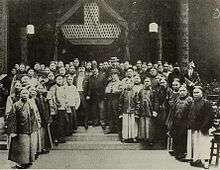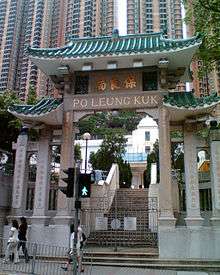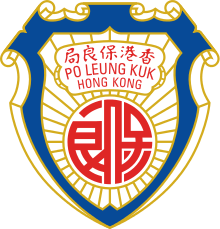Po Leung Kuk
The Po Leung Kuk (Chinese: 保良局), founded as the Society for the Protection of Women and Children,[1] is a charitable organisation in Hong Kong that provides support for orphaned children, education and other services.
History

In the late 19th century, abduction and trafficking of women and children were widespread in Hong Kong, under the mui tsai system. On 8 November 1878, a group of local Chinese (Lo Lai-ping, Shi Shang-kai, Fung Ming-shan and Tse Tat-shing)[2] presented a petition to the Governor of Hong Kong, John Pope Hennessy to set up Po Leung Kuk to rescue the kidnapped victims and the society was officially opened in August 1882.[3]
The stated objective of the Kuk, as it is informally known, is to care for the young and protect the innocent. In the early days, it was primarily engaged in suppressing abduction of women and children and providing shelters and education for such victims. There were some difficulties with the colonial government, as a result of cultural differences, but the overall intention of improving the lot of unfortunates was earnestly pursued. However, it has been suggested[3] that the arrangements the Kuk provided had the convenient effect of maintaining a supply of servants and potential concubines for the wealthy Chinese families of Hong Kong, in a "peculiarly Chinese form of patriarchy".[4]
Over time, it became apparent that greater demands were required of PLK. After several reviews by the Government, the Po Leung Kuk Incorporation Ordinance, comprising 35 clauses, was enacted in 1893, creating a more efficient system for PLK to operate under.
By the end of the 1930's, the government outlawed prostitution and the keeping of "Mui Tsai" (maids), and consequently the incidence of kidnapping fell. With the outbreak of the Sino-Japanese War, new social problems - such as the influx of refugees - had arisen, which brought along child abuse and abandonment. PLK expanded its service to provide vocational training and education to refugee women. During the Japanese occupation of Hong Kong, PLK took on more humanitarian responsibilities by providing shelter to the homeless. In the post-WWII period, PLK gradually extended its scope along with facility enhancement, to reinforce vocational training for women and children under our care.
In response to the rapid onset of social changes in the 1960's, PLK increased its coverage to include residential care, daycare, education, and rehabilitation of the mentally challenged. To meet these changes, the government amended the Ordinance of PLK in 1973, and the new Po Leung Kuk Incorporation Ordinance was enacted under Chapter 1040 of the Laws of Hong Kong. Following this, PLK became more involved in education services, and subsequently began to branch out to recreational services with the acquisition of land grants from the Government for a purpose-built holiday camp. By the 1980's, we extended the extent of our services to include elderly care.
Over the following century, Po Leung Kuk gradually evolved into a diversified organisation in line with the social and economic changes over time.Today Po Leung Kuk has over 300 units providing a wide spectrum of services, including social services (including medical services), educational services, recycling centres, recreational services and cultural services.[5]
Services

The Kuk currently runs more than 300 units throughout the SAR, providing welfare, educational, cultural and recreational services.
It is now known mostly for running schools in Hong Kong, with PLK Vicwood KT Chong Sixth Form College being their most widely known school for its academic excellence.[6]
See also
References
- ↑ "The Founding of Po Leung Kuk".
- ↑ Centenary History of the Po Leung Kuk Hong Kong 1878-1978.
- 1 2 A Concise History of Hong Kong, by John Mark Carroll, 2007. pp60-61
- ↑ The Protection of Women in 19th Century Hong Kong, Elizabeth Sinn, p164
- ↑ "Po Leung Kuk Annual Report 2017-18".
- ↑ "University Admission Statistics for Degree Courses 2003-2012". www.sfc-plk.edu.hk.
External links
| Wikimedia Commons has media related to Po Leung Kuk. |
